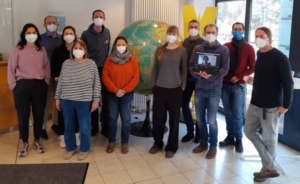The C-SCOPE project wants to expand marine carbon observations and make them more sustainable. What exactly is the interdisciplinary project team planning to do?

Together with colleagues from the Helmholtz Centre for Ocean Research Kiel (GEOMAR), the Leibniz Institute for Baltic Sea Research Warnemünde (IOW), the Friedrich Schiller University Jena (FSU), the Federal Maritime and Hydrographic Agency (BSH) and the State University of Rio de Janeiro (UERJ), researchers at the German Development Institute / Deutsches Institut für Entwicklungspolitik (DIE) have set out to expand marine carbon observations and make them more sustainable. The C-SCOPE project, funded by the German Federal Ministry of Education and Research (BMBF) for a period of three years, plans to close existing gaps in marine carbon observations, to improve data quality, and to make knowledge production on marine CO2 more transparent across multiple observation networks and stakeholders. The focus is on three geographic regions: the North Atlantic thermohaline circulation system, the Baltic Sea, and the Amazon rainforest system in South America.
After more than a year, the project team was finally able to meet in person at GEOMAR in Kiel to advance joint planning and to update each other on the progress over the past year and on potential delays due to the COVID-19 pandemic. In a joint discussion, the project team, which consists of natural and social scientists, exchanged ideas on how to best organise the interdisciplinary exchange in the project and on which products would particularly benefit from such an exchange. Among them were the development of a concept for relevant, reliable and easily accessible ocean science under the heading of „Open Ocean Science“. This concept should reflect different (disciplinary, cultural, …) demands for good scientific practice, as well as address existing inequalities and power dynamics in marine CO2 monitoring, in order to contribute to a sustainable ocean with transregionally balanced data access as part of the UN Decade of Ocean Research for Sustainable Development.
The DIE project team, consisting of Director Prof. Anna-Katharina Hornidge, Mirja Schoderer and Ramona Hägele, also shared reflections on the different forms of knowledge provided by science and the arts, which bundled results from the DIE event „An Engaging Ocean – Through Science and the Arts„, as well as first analysis results of data collection on a research cruise Ramona Hägele participated in this summer.
To learn more, follow the C-SCOPE team on Twitter!

Schreibe einen Kommentar